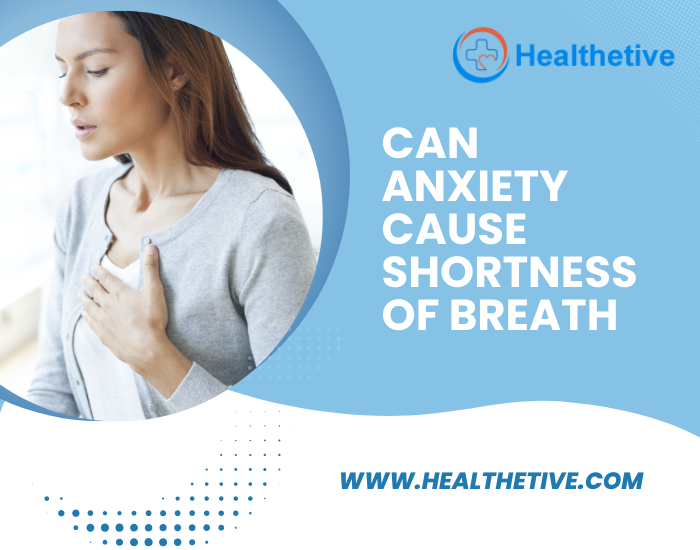Nowadays, Anxiety is a normal mental disorder that affects millions of people in the world. It expresses human emotions like feelings of fear, worry, and nervousness. Sometimes, that leads to some serious health conditions and causes mental change or physical symptoms. This article discusses the physical symptoms of anxiety, whether can anxiety cause shortness of breath, and how to manage it. Remember, if your family member or friend is suffering from severe anxiety, then take some extra care and take the right steps to manage anxiety and control its symptoms.
Why Does Anxiety Result in Shortness of Breath?
A combination of physical and psychological reactions could cause anxiety-related starts of breathing. Although it is a typical symptom of anxiety, sometimes one should urgently contact a doctor if difficulty of breath is serious and together with chest discomfort, dizziness, or fainting. These signs could result in major medical conditions, including heart attacks, pulmonary embolisms, or other breathing problems.
- Anxiety triggers hyperventilation, quick, superficial breathing. This raises the quantity of carbon dioxide during exhalation and unsettles and drives symptoms including vertigo, headache, and sensation of breathlessness.
- Anxiety triggers the stress and depression response, which the body calls the “fight or flight” reaction. This causes physical signs like shortness of breath as well as faster respiration, rising heart rate, and muscle tension.
- Painful or tight muscle condition produced during workout or long periods of inactivity by muscle tension. Still, anxiety can lead muscle tightness in the muscles around the rimcage and chest that impede deep breathing.
- Perception of difficulty of breathing: a condition where the individual might feel breathlessness. Anxiety can sometimes cause people to be quite aware of their breathing, which can give an impression of not getting enough oxygen, even if their breathing is normal.
Some Medication & Psychotherapy Treatments:
If one is agitated, though, never panic; there are many therapies. It is vital to see a psychiatrist or mental health therapist for a diagnosis of the root problem. Having measured your health status, they may suggest successful treatment.
Medication:
Medication is among the most efficient solutions available for effectively controlling anxiety; health care providers quite often advise several therapies. For people going through severe episodes, drugs can greatly reduce general anxiety and lower the frequency of anxiety-related symptoms—such as breathlessness—thereby offering much-desired relief.
Health experts frequently recommend benzodiazepine medicines, including alprazolam (Xanax), clonazepam (Klonopin), diazepam (Valium), and lorazepam (Ativan). Enhancing the effects of a neurotransmitter called gammaaminobutyric acid (GABA) in the brain, these drugs function to generate a calming influence. Though they come with a high risk of abuse and dependence, these treatments offer immediate relief and are good for the short-term control of anxiety symptoms. Therefore, this drug should be used under the direction of an experienced medical practitioner.
Psychology:
Effective treatment of anxiety could include cognitive behavioral therapy (CBT) and psychodynamic psychotherapy, among other psychiatric approaches, a health expert would recommend. For anxiety, psychodynamic psychotherapy is particularly helpful. Emphasizing the need of the patienttherapist relationship, this therapy provides a secure place for selfexploration. This process helps people to share their experiences.
Negative thinking patterns and behaviors related to anxiety are identified and changed by cognitive behavioral therapy (CBT), a structured and goal-directed method. With techniques including mindfulness, exposure therapy, and cognitive restructuring, CBT helps people to better control their anxiety. Patients might notice their quality of life improving.
Tips For Managing Anxiety & Induced Shortness of Breath:
Anxiety leads to behavioral and physiological changes. However, its physical symptoms are not easily identified. So, before taking any treatment or medication, ensure that it is causing shortness of breath related to anxiety or other diseases. If these symptoms occur due to anxiety, then the following information is very helpful for managing the anxiety.
- Grounding techniques: These techniques occur the relaxation of various muscle groups across the physical structure. It could relieve bodily stress and enhance the general sense of calm, therefore reducing anxiety-driven shortness of breath.
- Exercise: Regular physical activity can, over time, alleviate general anxiety, increase overall lung function, and help control your body’s stress reaction. Even basic tasks, including yoga or walking, can provide an advantage.
- Meditation: One can stay in the present moment and relax the nervous system with meditation. Particular software can help one follow meditation sessions and breathing techniques.
Conclusion:
Though it is usually kind when associated with anxiety, shortness of breath is a prevalent sign of anxiety. You can control anxiety-induced breathlessness and enhance your general health by utilizing relaxation exercises, engaging in standard physical activity, and getting help as required.

